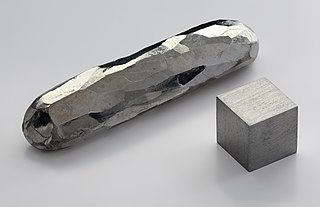Cadmium is a chemical element with the symbol Cd and atomic number 48.
Cadmium may also refer to:
- Cadmium (album), album by Sky
- "Cadmium" (song), song by Pinegrove
- Cadmia (Latin for cadmium), an alchemical substance
Cadmium is a chemical element with the symbol Cd and atomic number 48.
Cadmium may also refer to:

Cadmium is a chemical element; it has symbol Cd and atomic number 48. This soft, silvery-white metal is chemically similar to the two other stable metals in group 12, zinc and mercury. Like zinc, it demonstrates oxidation state +2 in most of its compounds, and like mercury, it has a lower melting point than the transition metals in groups 3 through 11. Cadmium and its congeners in group 12 are often not considered transition metals, in that they do not have partly filled d or f electron shells in the elemental or common oxidation states. The average concentration of cadmium in Earth's crust is between 0.1 and 0.5 parts per million (ppm). It was discovered in 1817 simultaneously by Stromeyer and Hermann, both in Germany, as an impurity in zinc carbonate.
Hollywood usually refers to:
No or NO may refer to:
True most commonly refers to truth, the state of being in congruence with fact or reality.
48 (forty-eight) is the natural number following 47 and preceding 49. It is one third of a gross, or four dozens.
This may refer to:
Cadmium is a naturally occurring toxic metal with common exposure in industrial workplaces, plant soils, and from smoking. Due to its low permissible exposure in humans, overexposure may occur even in situations where trace quantities of cadmium are found. Cadmium is used extensively in electroplating, although the nature of the operation does not generally lead to overexposure. Cadmium is also found in some industrial paints and may represent a hazard when sprayed. Operations involving removal of cadmium paints by scraping or blasting may pose a significant hazard. The primary use of cadmium is in the manufacturing of NiCd rechargeable batteries. The primary source for cadmium is as a byproduct of refining zinc metal. Exposures to cadmium are addressed in specific standards for the general industry, shipyard employment, the construction industry, and the agricultural industry.
Metal fume fever, also known as brass founders' ague, brass shakes, zinc shakes, galvie flu, galvo poisoning, metal dust fever, welding shivers, or Monday morning fever, is an illness primarily caused by exposure to chemicals such as zinc oxide (ZnO), aluminium oxide (Al2O3), or magnesium oxide (MgO) which are produced as byproducts in the fumes that result when certain metals are heated. Other common sources are fuming silver, gold, platinum, and chromium.
Memory is an organism's ability to store, retain, and recall information.

Cadmium fluoride (CdF2) is a mostly water-insoluble source of cadmium used in oxygen-sensitive applications, such as the production of metallic alloys. In extremely low concentrations (ppm), this and other fluoride compounds are used in limited medical treatment protocols. Fluoride compounds also have significant uses in synthetic organic chemistry. The standard enthalpy has been found to be -167.39 kcal. mole−1 and the Gibbs energy of formation has been found to be -155.4 kcal. mole−1, and the heat of sublimation was determined to be 76 kcal. mole−1.
Alcohol most commonly refers to:
Let It Be most commonly refers to:

Cadmium oxide is an inorganic compound with the formula CdO. It is one of the main precursors to other cadmium compounds. It crystallizes in a cubic rocksalt lattice like sodium chloride, with octahedral cation and anion centers. It occurs naturally as the rare mineral monteponite. Cadmium oxide can be found as a colorless amorphous powder or as brown or red crystals. Cadmium oxide is an n-type semiconductor with a band gap of 2.18 eV at room temperature.

James Morrison Catchpole is an English singer, songwriter and guitarist. In 2006, his debut single "You Give Me Something" became a hit in Europe, Australia, Japan and Iran, peaking in the top five in the UK and claiming the number one spot in New Zealand. It preceded the release of his debut album Undiscovered (2006), which was released through Polydor Records and debuted atop the UK Albums Chart. In 2007, Morrison won the Brit Award for Best British Male.
Other often refers to:
Searching may refer to:
Yes or YES may refer to:
Talk may refer to:

Cardinal is the second studio album by American rock band Pinegrove, released February 12, 2016 on Run for Cover. Pinegrove formed in Montclair, New Jersey in 2010, and spent their early years self-releasing their music and performing at DIY shows. Their first record, Meridian, was released in 2012, and later compiled into the mixtape Everything So Far (2014). In the early 2010s, the members relocated from their hometown of Montclair to Brooklyn, New York. The band's frontman, singer-songwriter Evan Stephens Hall, however, decided to return home, where he and drummer Zack Levine produced Cardinal.
"Cadmium" is a song recorded by the American rock band Pinegrove. It was released on January 27, 2016, by Run for Cover Records, as the second single from the band's second studio album, Cardinal. It was written by the singer-songwriter Evan Stephens Hall.